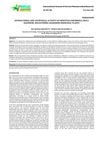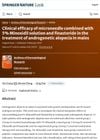 118 citations,
July 2005 in “Journal of Ethnopharmacology”
118 citations,
July 2005 in “Journal of Ethnopharmacology” Eclipta alba extract improved learning, memory, and stress-related ulcers in rats without affecting movement or causing anxiety.
 68 citations,
May 2018 in “PLOS Biology”
68 citations,
May 2018 in “PLOS Biology” Cyclosporine A may help treat hair loss by blocking a protein that inhibits hair growth.
 39 citations,
January 2016 in “PubMed”
39 citations,
January 2016 in “PubMed” Understanding how EDC genes are regulated can help develop better drugs for skin diseases.
 25 citations,
September 2018 in “Scientific Reports”
25 citations,
September 2018 in “Scientific Reports” Morroniside may help hair grow and stay in its growth phase by affecting certain cell signals.
 14 citations,
July 2021 in “Biomolecules”
14 citations,
July 2021 in “Biomolecules” Centipeda minima extract helps hair grow by activating important growth signals and could be a promising hair loss treatment.
 9 citations,
February 2011 in “Revista Brasileira de Farmacognosia”
9 citations,
February 2011 in “Revista Brasileira de Farmacognosia” Tridax procumbens plant parts boost immune response in mice.
 7 citations,
February 2019 in “Journal of pharmacological sciences”
7 citations,
February 2019 in “Journal of pharmacological sciences” Bazhengsan reduces inflammation and tissue growth in chronic prostatitis.
 5 citations,
October 2020 in “Lasers in Medical Science”
5 citations,
October 2020 in “Lasers in Medical Science” Combination therapy works best for female hair loss, increasing density and thickness.
 1 citations,
February 2022 in “Scholars international journal of traditional and complementary medicine”
1 citations,
February 2022 in “Scholars international journal of traditional and complementary medicine” The herbal hair gel is effective, eco-friendly, and non-irritating with antifungal properties.
 1 citations,
January 2020 in “International journal of research in pharmacy and chemistry”
1 citations,
January 2020 in “International journal of research in pharmacy and chemistry” Eclipta alba has many health benefits and potential for medical and nutritional use.
 1 citations,
March 2019 in “International Journal of Current Pharmaceutical Research”
1 citations,
March 2019 in “International Journal of Current Pharmaceutical Research” The essential oils from Hedyotis corymbosa, Inula racemose, and Holostemma adakodien have significant antibacterial and antifungal properties.

Eclipta alba L. (Urang-Aring) can help treat hair loss.
4 citations,
October 2017 in “Indian drugs” Hibiscus rosa-sinensis L. leaves and flowers contain various compounds with potential medicinal uses.
January 2020 in “Estetologia Medyczna i Kosmetologia” Most ingredients in anti-hair loss products lack scientific proof of effectiveness.
2 citations,
April 2022 in “Biomedicines” Low-frequency electromagnetic fields may help hair growth by affecting certain growth-related molecules.
December 2024 in “IntechOpen eBooks” Drug repurposing speeds up development, cuts costs, and uses known safe drugs, but faces challenges like regulations and patents.
September 2024 in “Journal of Ethnopharmacology” Terminalia bellirica extracts effectively promote hair regrowth and treat androgenetic alopecia.
 4 citations,
August 2021 in “Annals of Translational Medicine”
4 citations,
August 2021 in “Annals of Translational Medicine” Dihydroartemisinin helps reduce prostate enlargement in rats by stopping the growth of prostate cells.
1 citations,
October 2022 in “Evidence-based Complementary and Alternative Medicine” Traditional Chinese Medicine may help treat hair loss but needs more research.
 February 2025 in “Archives of Dermatological Research”
February 2025 in “Archives of Dermatological Research” Combining microneedling with Minoxidil and Finasteride greatly improves hair growth and reduces hair loss in men.
 December 2024 in “Journal of General-Procedural Dermatology & Venereology Indonesia”
December 2024 in “Journal of General-Procedural Dermatology & Venereology Indonesia” The serum effectively reduces hair loss and improves hair growth without side effects.
 October 2024 in “A I Burnasyan Federal Medical Biophysical Center Clinical Bulletin”
October 2024 in “A I Burnasyan Federal Medical Biophysical Center Clinical Bulletin” Various treatments effectively manage androgenetic alopecia.
 November 2023 in “Journal of Cosmetic Dermatology”
November 2023 in “Journal of Cosmetic Dermatology” The topical treatment with caffeine and Procapil 3% improved male pattern hair loss and was well tolerated after 12 weeks.
October 2022 in “Our Dermatology Online” The Trust tonic is more effective than minoxidil for treating hair loss.
 December 2024 in “International Journal of Advanced Research in Science Communication and Technology”
December 2024 in “International Journal of Advanced Research in Science Communication and Technology” The herbal hair tonic is safe, effective for hair growth, and treats scalp issues.
 January 2024 in “International journal of pharmaceutical sciences review and research”
January 2024 in “International journal of pharmaceutical sciences review and research” Indian jujube has many medicinal properties and can help treat ailments like diabetes, inflammation, and cancer.

Two nutritional supplements improved hair growth and reduced hair loss in women with hair loss conditions.




















